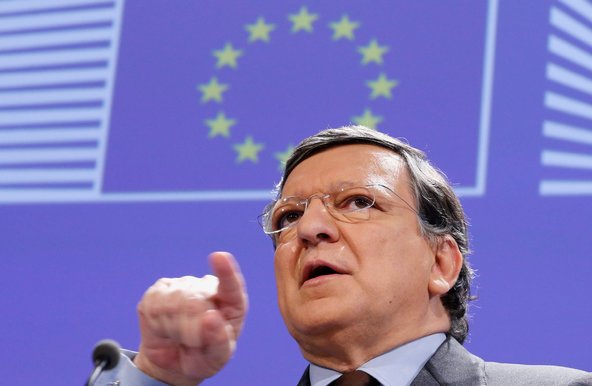 Francois Lenoir/ReutersJose Manuel Barroso, president of the European Commission, which oversees antitrust regulation.
Francois Lenoir/ReutersJose Manuel Barroso, president of the European Commission, which oversees antitrust regulation.
BRUSSELS — European Union antitrust regulators have expanded their investigation into whether a small network of big banks unfairly controls the derivatives market.
The inquiry, which has already ensnared major international giants like Barclays, JPMorgan Chase and Deutsche Bank, has been broadened to include the International Swaps and Derivatives Association, a trade organization for market participants.
The European Commission, which oversees antitrust regulation, had “found preliminary indications that I.S.D.A. may have been involved in a coordinated effort of investment banks to delay or prevent exchanges from entering the credit derivatives business,” European antitrust regulators said in a statement. “Such behavior, if established, would stifle competition in the internal market in breach of E.U. antitrust rules.”
The commission has the power to levy fines as much as 10 percent of a firm’s global annual sales in such cases, although fines rarely, if ever, go that high.
“I.S.D.A. is aware that it has been made subject to these proceedings,” the association said in a statement sent by e-mail. “I.S.D.A. is confident that it has acted properly at all times and has not infringed E.U. competition rules,” the statement said, adding that the association was co-operating fully with regulatory authorities.
The European investigation, like a similar one undertaken earlier by United States Department of Justice, highlights efforts by regulators to address concerns that large banks may be using unfair methods to control highly lucrative corners of finance.
The investigation, which began in April 2011, focuses on whether 16 banks worked with the Markit Group, a data provider, to create pricing procedures and indices related to a type of derivative known as credit default swaps. Authorities are also looking into whether a deal between nine banks and the Intercontinental Exchange might have been unfair to other players in the market.
The commission is using the full arsenal of European Union competition law to investigate the matter, including a statute prohibiting firms from covertly rigging the market and another prohibiting big firms from bullying smaller ones. The commission said on Tuesday that it suspected the banks of acting “through collusion or an abuse of a possible collective dominance.”
Regulators on both sides of the Atlantic have pursued the investigations because the effects could extend well beyond the world of finance into the wider economy. A number of industries, including airlines, energy companies and food manufacturers, rely on the derivatives market to help manage their risk and protect their profits.
Article source: http://dealbook.nytimes.com/2013/03/26/europe-expands-investigation-into-derivatives-market/?partner=rss&emc=rss